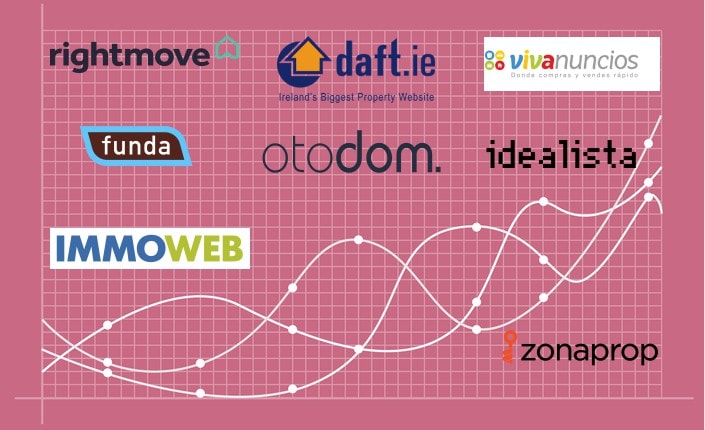
Speaking in an interview which will be coming to Online Marketplaces very soon, Frontier Digital Ventures CEO Shaun Di Gregorio told me that over the last 12 months his company had found that for online marketplaces "if you were an incumbent you tended to benefit from what was a flight to safety in many markets". The statement makes sense and is grounded in the logic that consumers instinctively turn to a brand or a product that they trust in times of hardship and uncertainty.
Although it makes sense and I believed Shaun when he told me -- as the name of Shaun's company suggests, they know a lot about emerging markets and I know for a fact that FDV keeps meticulous tabs on all sorts of metrics in the online marketplaces industry -- I still wanted to see if this theory played out for leading property portal brands around the world. A recent investigation from internet research tool company Semrush has shown that since the onset of the pandemic, market leaders in some of the most important e-commerce sectors have not been the ones to see the biggest traffic rise.
This analysis set out to investigate whether consumers around the world have uniformly been falling back to the trusted brand portal when looking for a new home (or idly browsing). Has the pandemic changed the dynamic of brand market dominance in some markets? Has it exacerbated trends in market dominance that were appearing before the word 'covid' entered our vocabularies?
Although it might be interesting to compare and contrast other metrics later on, what I was interested in initially was the change over time of a brand's strength before and since the onset of the coronavirus pandemic, not in absolute traffic as a metric. As I've found out to my cost in a previous analysis, third party traffic estimation tools such as similarweb can be notoriously inaccurate in some markets and for this investigation, I have deliberately used freely available data from Google Trends.
While Google Trends data is by no means the definitive measuring stick for a brand's strength and much less a metric for property portals to live and die by, the data there is as good a proxy metric as any for the relative strength of a brand over time. For a variety of reasons (explained in the methodology), I have had to exclude a lot of data from the analysis but there are some interesting pictures painted in broad brushstrokes about what is happening on a meta-level with portal brands in some markets nonetheless.
As anyone who works in marketing will tell you, brands take a long time to establish in the public consciousness and market-leading brands are hard to shift into second place. For the analysis, I wanted to measure how the #1 property portal brand in a given market has performed as a keyword in Google search relative to its nearest rival. To give some pre-pandemic context, the date ranges used were from April 2018 to April 2021. As we'll see, in some cases market-leading brands' trajectories have simply followed a pre-pandemic pattern and in others, the pandemic and the change in mindset that accompanied it seem to have rocked the boat in one way or another...
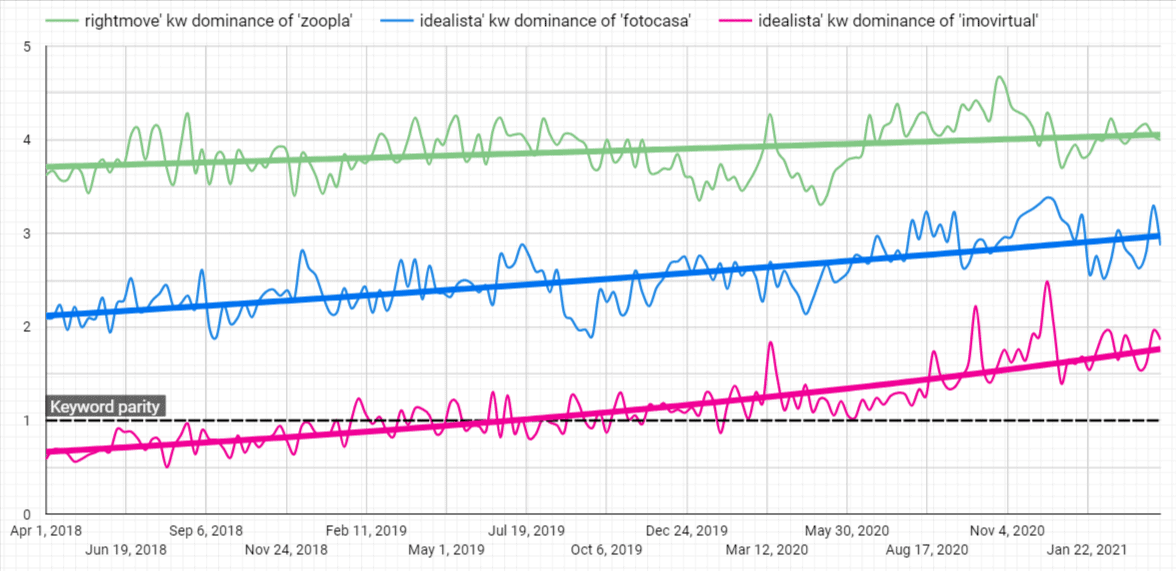
The number on the y-axis is the multiple of Google search volume of the leading brand over its nearest rival. Three years ago 'rightmove' was searched around 3.5 times more on average than 'zoopla' in the UK, 'idealista' was searched for about 2.2 times more than 'fotocasa' and in Portugal 'idealista' was in second place at around 0.6 times the search volume of OLX Group's 'imovirtual'.
As we can see, all three of these brands were steadily gaining in search volume dominance before the pandemic. March 2020 saw a spike in dominance for Rightmove and idealista in Portugal and since then the trends have increased with 'rightmove' now being searched around 4 times more than 'zoopla' on Google in the UK, and 'idealista' being a keyword with 3 times more search volume than 'fotocasa' in Spain and nearly twice as much search volume as 'imovirtual' in Portugal after achieving parity with Imovirtual around July 2019.
The trend is similar, if a bit more stark, in Poland where leading OLX-backed Otodom holds a big lead in Google searches over its nearest rival the Axel Springer-owned Morizon.
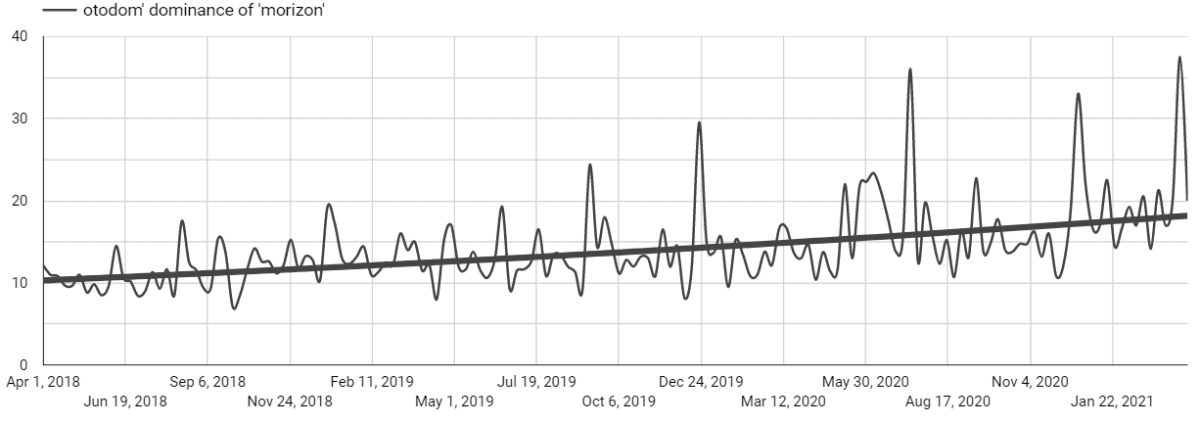
There are a few markets where the leading portal brands are so dominant that the pandemic came and did little to impact the status quo with regards to the relative strength of branded keywords in Google search.
In The Netherlands, ‘funda’ has long enjoyed a very healthy dominance in Google search over nearest rival ‘jaap’ and that looks set to continue.
the same can be said for ‘daft’ dominance in Ireland, ‘hemnet’ dominance in Sweden and ‘immoweb’ dominance in Belgium. In all three of these markets, the number two portals have seen a growth in relative brand keyword strength against their dominant rivals since the onset of the pandemic, but not nearly enough to seriously challenge them or bring anything close to keyword parity in Google search. The starkest example is in the Swedish market where despite searches for ‘booli’ more than doubling since the start of the pandemic compared to its rival, ‘hemnet’ as a term is still searched for by Google search users around 15 times more.
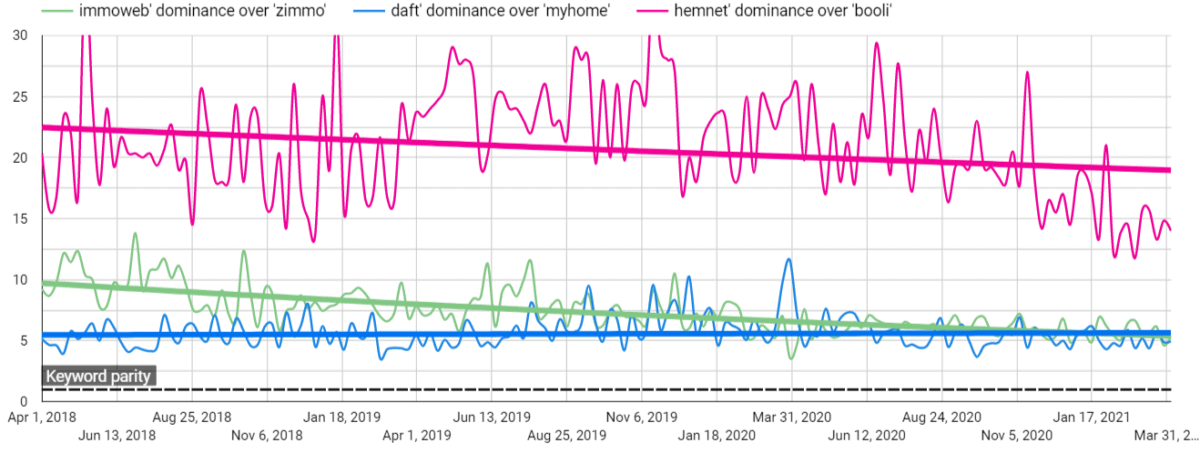
In some cases, the period coinciding with the global covid pandemic has seen some portal brands catch up with the established brand in the country. Two examples of this I saw were Mexico where eBay (and more recently Adevinta) owned Vivanuncios has been losing its keyword dominance over Navent-owned Inmuebles24 in Google search for some time.
The other example comes from Malaysia where iProperty and PropertyGuru have recently been embroiled in a PR war over who is #1. It would appear that the gap between the relative strengths of the two portals' branded keywords on Google is disappearing and that any 'top of mind' benefit that iProperty might have claimed 3 years ago has faded somewhat.
The pandemic didn't really hasten the trend much in either case and in both countries, the top two portals are close to parity in terms of keyword searches on Google nowadays.
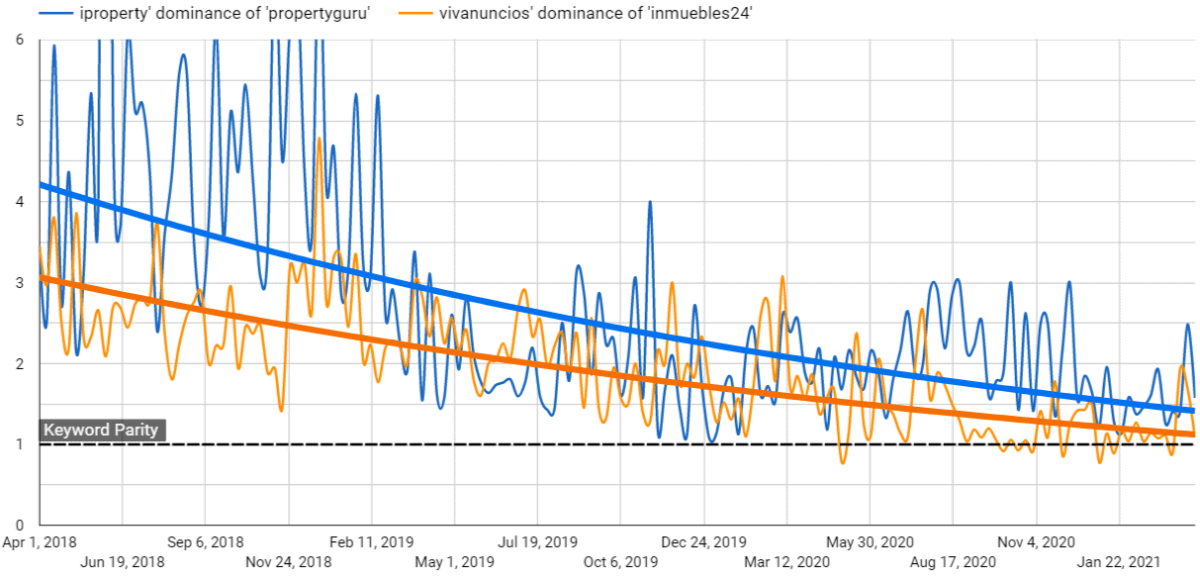
Argentina's property portal market is remarkable in that the two leading players' traffic coming from their brands being searched on Google seems to follow each other with peaks and troughs mirrored exactly. Both saw proportional drops during the worst of the pandemic in March of 2020 followed by traffic increases which were proportionally almost exactly the same.
In the case of India, both leading portals have names that are commonly searched for both with and without a space character in the middle of them. Because both of them are the same in this respect I have broken rule 4 from the methodology and have made a composite score for both portals with and without the space in their name. The result is pretty much the same with or without spaces, a very very slight decline in relative Google searches for 99acres compared to MagicBricks over the last 3 years but nothing the Info Edge-owned portal will be unduly worried about.
The only real change to the status quo in India is that both 99acres and MagicBricks have seen a slight drop in Google searches since the onset of the pandemic with search volumes in India down by around 15% for both since April 2020.
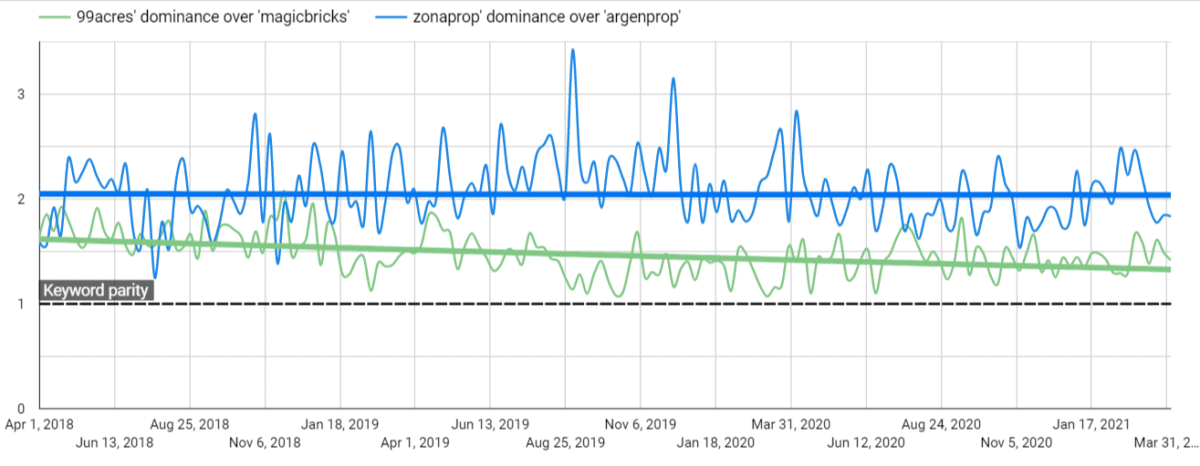
The first two markets I looked at were the UK and Spain, and after seeing these two I was expecting an easy article write up and some degree of uniformity across the board. That turned out not to be the case and nor should it be. Brands and their power and influence are complicated things that companies spend a lot of time and money thinking about. Their power over us as consumers changes slowly.
In some cases, the pandemic seems to have amplified trends that had already been set in motion in the years before and in others, it does seem to have given a slight boost to the market leader. If anything, the main conclusion from this is that brands serve as protective moats to a lot of these leading property portals and that every day that one particular portal brand spends at the top of consumer minds, it becomes more and more difficult for new entrants to challenge them.
When Michael Bruce, the co-founder of the newly launched British portal Boomin, said recently that his portal would become a "household name in record time" the statement seemed very ambitious. It may well be that the ambition of becoming a household name is simply not enough for a brand to dominate a market.
The study is obviously a fairly superficial look at brand strength through Google search volume of branded keywords. It's important to note that the percentage of overall portal traffic that organic traffic from search engines makes up is liable to fluctuate from market to market and its importance to these businesses and brands will vary.
For a true apples to apples comparison, this analysis had to make sure that, as far as possible, the search intent for these keywords was to land on a given property portal's website and search for real estate. For that it was necessary to exclude the following markets and keywords:
All of the graphs (apart from The Netherlands which is taken directly from Google Trends) were made by taking Google trends data and dividing the relative search volume of the leading portal by that of the #2 portal for each country (calculated by traffic stats over the past 5 months on similarweb). All trend lines are exponential and are generated by the Google Charts engine and rendered in Google Data Studio.